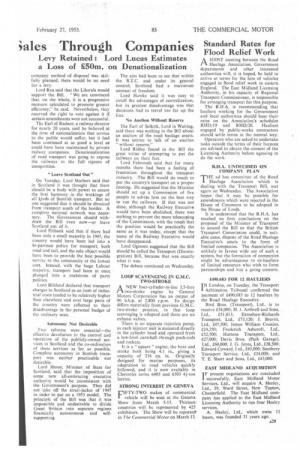;ales Through Companies
Page 31

If you've noticed an error in this article please click here to report it so we can fix it.
Levy Retained : Lord Lucas Estimates a Loss of £50m. on Denationalization
company method of disposal was skilfully planned, there would be no need for a levy.
Lord Rea said that the Liberals would support the Bill. "We are convinced that, on the whole, it is a progressive measure calculated to promote greater efficiency," he said. Nevertheless, they reserved the right to vote against it if certain amendments were not successful.
The Earl of Radnor, a railway director for nearly 20 years, said he believed at the time of nationalization that service to the public would suffer, but it had been continued at as good a level as could have been .maintained by private railway companies. Denationalization of road transport was going to expose the railways to the full rigours of competition.
"Leave Scotland Out" On Tuesday, Lord Mathers said that in Scotland it was thought that there should be a body with power to secure the best harmony in the workings of all kinds of Scottish transport. But no one suggested that it should be divorced from transport south of the border. A complete national network was necessary. The Government Should withdraw the Bill even now—or leave. Scotland out of it.
Lord Elibank said that if there had been only a small majority in 1945, the country would have been fed into a bi-partisan policy for transport, both road and rail, and the sole object would have been to provide the best possible service to the community at the lowest cost. Instead, with the huge Labour majority, transport had been at once plunged into a mmlstrom of party politics, Lord Bilsland declared that transport charges in Scotland as an itern of industrial costs tended to be relatively higher than elsewhere and over large parts of the country were reflected to their disadvantage in the personal budget of the ordinary man.
Autonomy Not Desirable 'rwo reforms were essential—the effective devolution in the control and operation of the publicly-owned services in Scotland and the co-ordination of these services as far as possible. Complete autonomy in Scottish transport was neither practicable nor desirable.
Lord Home, Minister of State for Scotland, said that the imposition of some new all-embracing executive authority would be inconsistent with the Government's purpose. They did not take off the strait-jacket of 1947 in order to put on a 1953 model. The principle of the Bill was that it was impossible and undesirable to divide Great Britain into separate regions financially autonomous and selfsupporting
The aim had been to see that within the B.T.C. and under its general control, Scotland had a maximum amount of freedom.
Lord Hawke said it was easy to extoll the advantages of centralization, but its greatest disadvantage was that decisions had to travel too far up the line.
No Auction Without Reserve The Earl of Selkirk, Lord in Waiting, said there was nothing in the Bill about an auction of the road haulage assets. It was untrue to talk of an auction " without reserve."
Lord Ridley found in the Bill the great virtue of attempting to put the railways on their feet.
Lord Falmouth said that for many months there had been a feeling of frustration throughout the transport industry. The Bill would do much to put the country's transport on a proper footing. He suggested that the Minister should set up a Commission of five people to advise him on the best way to run the railways. If that was not done, although the Railway Executive would have been abolished, there was nothing to prevent the mere telescoping of the Commission, with the result that the position would be practically the same as it was today, except that the name of the Railway Executive would have disappeared.
Lord Ogmore suggested that the Bill should be called the Transport (Disintegration) Bill, because that was exactly what it was.
The debate continued on Wednesday.
LOOP SCAVENGING IN G.M.C. TWO-STROKE
A NEW four-cylinder-in-line 3.5-litre rt two-stroke engine by General Motors Corporation has an output of 90 b.h.p. at 2,800 r.p.m. Its design differs materially from previous G.M.C. two-stroke practice, in that loop scavenging is adopted and there are no exhaust valves.
There is no separate injection pump, as each injector unit is mounted directly in the cylinder head and operated from a low-level camshaft through push-rods and rockers.
It is a " square " engine, the bore and stroke both being 4.1 in., giving a capacity of 216 Cu. in. Originally designed for marine purposes, its adaptation to road vehicles quickly followed, and it is now available in Chevrolet series 6403 and 6503 4i-ton lorries.
STRONG INTEREST IN GENEVA
LIFTY-TWO makes of commercial 1 vehicle wilI be seen at the Geneva Show from March 5-15. Thirteen countries will be represented by 425 exhibitors. The Show will be reported' in The Commercial Motor on March 13.




















































































